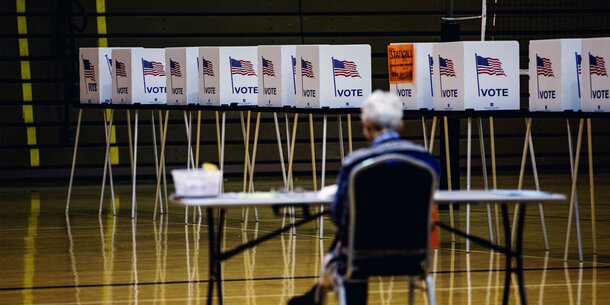Last week, Arizona’s attorney general and lawyers for the Arizona Republican Party asked the Supreme Court to weaken the Voting Rights Act of 1965, the nation’s most effective defense against racially discriminatory voting policies for generations, arguing that the law hamstrings the running of elections by laying virtually any voting policy open to legal challenge.
As election officials with decades of experience administering elections in very different parts of the country, we strongly disagree that the Voting Rights Act is an impediment to running elections. Weakening the law would in fact likely hobble our mission of ensuring equal access to the ballot for all voters.
The case before the court, Brnovich v. DNC, is a challenge to two Arizona voting policies. One is the state’s “out of precinct” policy, under which a voter’s ballot is rejected if it is cast in the wrong precinct. The other policy bars anyone who is not a caretaker or immediate family member from collecting and mailing in a voter’s mail ballot.
Last year, the Ninth Circuit Court of Appeals found that the policies violated Section 2 of the Voting Rights Act because they resulted in discrimination. The court did not condemn these policies as a general matter, but because of the unique way that they worked in Arizona. In Arizona, Native American, Latino, and Black voters are disproportionately likely to vote out of precinct and use ballot collection services due to factors that include frequent changes in both polling locations and voters’ home addresses. Tellingly, the court also found that the ballot collection ban was intended to discriminate against minority voters.
But Arizona Attorney General Mark Brnovich and the Republican Party aren’t just defending these policies. They’re also attacking Section 2 of the Voting Rights Act itself, which allows Americans to bringing lawsuits to challenge illegal voter suppression tactics. They claim that this right hinders legitimate election administration by encouraging aggressive litigation, threatening to usurp the role of state and local law in administering elections.
Having worked on the front lines of election administration for many years, we can attest that these concerns are fundamentally misplaced. In our experience, Section 2 is an important tool for ensuring equal opportunity for all eligible voters, which is the basic goal of election administration. That’s why we, along with current and former state and local election officials from 38 states, filed a friend-of-the-court brief urging the justices to reject any attempt to weaken the Voting Rights Act. And we don’t see this as a partisan issue—one of us is a Republican, the other a Democrat.
As amended in 1982, the law prohibits policies that result in a racially discriminatory impact, even if they weren’t clearly motivated by racism. Since Congress adopted the “results” test, election officials like us have conducted tens of thousands of elections in thousands of jurisdictions nationwide. Virtually all have been run without interference from Section 2 lawsuits. And there is no sound basis to conclude that there will suddenly be an explosion in such challenges now.
It’s not hard to see why. There are many legal and practical limits to bringing successful Section 2 challenges, which are complex and expensive to litigate and even harder to win.
But that doesn’t mean Section 2 isn’t a key tool for ensuring fair elections. In fact, it has taken on new significance in the years since a 5–4 majority of the Supreme Court gutted Section 5 of the Voting Rights Act in 2013 in a case called Shelby County v. Holder. That decision mothballed the requirement that jurisdictions with a history of race discrimination get federal approval before making any election rule changes. Shelby County leaves Section 2 as the most powerful weapon we have in the fight against voting discrimination.
It’s clear that the Voting Rights Act has not hampered the effective administration of state and local elections. To the contrary, it has served a vital role in the administration of American elections by providing a backstop against policies that have markedly discriminatory impacts on the opportunity to participate in the political process.
Racial disparities in voting access have no place in our democracy, and Section 2 of the Voting Rights Act is a boon, not a burden, for our work in running elections that are equally accessible to all eligible voters.
Mark Earley is the supervisor of elections for Leon County, Florida, and a Democrat. Abbie Mace is the clerk of Fremont County, Idaho, and a Republican.


